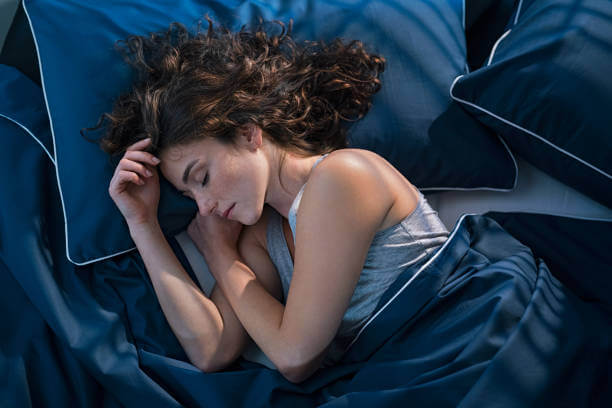Study: Medical cannabis for chronic sleep disorders

Chronic sleep disorders are extremely stressful. Productivity and health are impaired because those affected cannot recover sufficiently at night. In a double-blind study the effect of medicinal cannabis on chronic sleep disorders (chronic insomnia) was investigated for the first time by an Australian research team.
The result: A cannabis extract with the cannabinoids tetrahydrocannabinol (THC), cannabinol (CBN) and cannabidiol (CBD) is an effective and safe therapy for chronic insomnia.
Two-week cross-over study with cannabis extract and placebo in 24 sufferers with chronic insomnia
At the Centre for Sleep Research at the University of Western Australia 24 patients with an average age of 53 years took part in the randomised, placebo-controlled cross-over study. In this study sleep behaviour without medication was monitored for a fortnight with an activity monitor worn on the wrist and with sleep diaries. The participants recorded how long they fell asleep, how long they slept, the quality of their sleep and how restful their sleep was. In addition the researchers carried out a polysomnography in the sleep laboratory, whereby the body functions of the sleeping person were observed during one night. Afterwards the 24 participants were randomly assigned to the cannabinoid or placebo group, whereby neither the patients nor the researchers knew whether they were taking placebo or cannabis. The two-week study phase was followed by a week without medication before the patients switched to the other group. Monitoring was also done using a sleep diary, activity tracker and polysomnography. The researchers used an oily extract containing THC, CBN, CBD and terpenes as a cannabis-based medicine. The placebo extract contained the same terpenes but no cannabinoids. The participants took the medication sublingually, i.e. under the tongue, one hour before bedtime every day. After four days the dose could be doubled after medical consultation. In order to determine possible side effects, the researchers contacted the participants during the first days and after dose increases.
Side effects disappear overnight or quickly after awakening
Two-thirds (67%) experienced mild side effect but these largely disappeared overnight or shortly after awakening. The most common were dry mouth and dizziness. Only one subject discontinued the study due to adverse effects, therefore data from 23 patients were analysed. Caution should be exercised in elderly patients and those with a psychiatric history as hallucinations and dizziness are problematic.
Medical cannabis shortens the time it takes to fall asleep and extends sleep time
The sleep diaries of the study participants showed clear improvements in sleep: sleep duration increased. When taking the placebo extract, this averaged 5.06 hours and climbed to 6.11 hours with medicinal cannabis. Cannabis was thus able to extend sleep duration by a good hour. The time to fall asleep was also 38.1 minutes with cannabis, compared to 46.9 minutes with placebo. Those affected fell asleep 8.8 minutes faster on average with the cannabis drug.
The measurements by means of activity monitor and polysomnography also proved improvements: Under placebothe sleep duration was 6.52 hours according to the measuring devices and increased by 33.5 minutes to 7.07 hours when taking the cannabis extract. Thus the participants who took cannabis reached the recommended sleeping time of about 7 hours for adults.
Improved sleep quality and recovery
The participants also rated sleep quality and restfulness on a scale from 0 (very poor or not rested) to 4 (very good or very rested). As a result the patients rated sleep quality as 2.5 and restfulness as 1.2 without taking medication and under placebo.
Both ratios improved with the cannabis extract to 1.8 for recovery and 3.2 for sleep quality. Those affected slept better with medicinal cannabis and woke up more refreshed. Another positive effect is that the assessed cannabis extract does not influence the duration of sleep stages.
At what point are sleep disorders chronic?
6 to 15 percent of the population has to struggle with chronic sleep disorders that occur in the form of difficulty falling asleep and/or sleeping through the night. If the complaints appear on more than 3 nights a week and persist for longer than 3 months, experts speak of chronic insomnia. While patients with insomnia need more than half an hour to fall asleep, patients with insomnia wake up at night and stay awake for more than 30 minutes or wake up very early in the morning (more than 30 minutes before the desired wake-up time).
Larger studies needed
The scientists concluded that medicinal cannabis can be an alternative for chronic sleep disorders. However studies with larger groups of people are needed to clearly prove the effect and to inspect the optimal dosage.
Sources:
Jennifer H Walsh, Kathleen J Maddison, Tim Rankin, Kevin Murray, Nigel McArdle, Melissa J Ree, David R Hillman, Peter R Eastwood, Treating Insomnia Symptoms with Medicinal Cannabis: A Randomized, Cross-Over Trial of the Efficacy of a Cannabinoid Medicine Compared with Placebo, Sleep, 2021;, zsab149, https://doi.org/10.1093/sleep/zsab149


